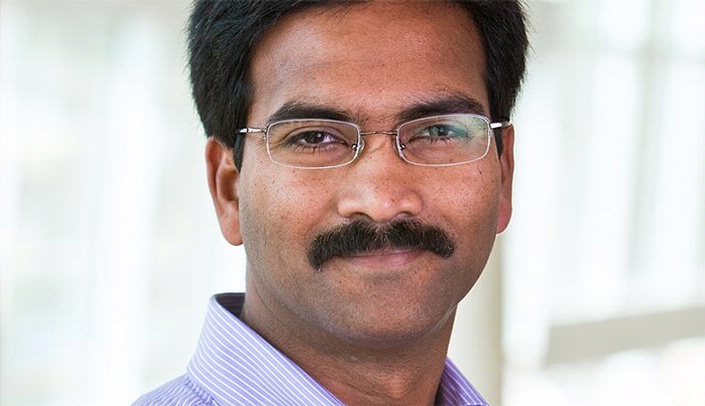The promised era of precision medicine gets a boost from the Fred & Pamela Buffett Cancer Center through its partnership with IBM’s Watson Genomic Analytics program.
It takes only 10 minutes for the IBM program to identify relevant mutations and potential drugs that may be considered in a treatment regime – all based on the patient’s genomic profile and the specific mutations.
It’s been described as a cognitive system, one that mimics some, but not all capabilities of the human mind. The capabilities it does have include ingesting large volumes of information, identifying the information that’s relevant and then learning from the results of its use.
The Fred & Pamela Buffett Cancer Center at UNMC and Nebraska Medicine is one of 14 leading cancer institutes to partner on the project, which is part of IBM’s broader Watson Health initiative to advance patient-centered care and improve health while building on IBM research advancements. We spoke to Babu Guda, Ph.D., associate professor of genetics, cell biology and anatomy, and director of the Bioinformatics Systems Biology Core Facility at UNMC, about the collaboration.
Why is the Watson Genome Project an exciting partnership?
This is the first time there is a product like this, which can mine through large data points and extract the information in an efficient way. Previously, we had been doing this manually. Each database is different, and we had to go through different types of databases. Each database carries a type of information, but there is no connection between them. And we had to make those connections ourselves, whereas this IBM Watson analytics program can do the same thing and get the information out quickly.
What does UNMC’s inclusion in this process say about UNMC’s status in the field?
It means that we are one of the leaders in the field in terms of applying the knowledge toward personalized medicine. We are really privileged to have access to this.
You are collaborating with Ken Cowan, M.D., Ph.D., director of the Fred & Pamela Buffett Cancer Center, and you will be analyzing cancer genomes. Can you tell me a little more about the work you are doing and the potential application of the work?
Right now, it’s only a research project. But eventually, if we are satisfied and convinced these products really work, we can apply the same thing for clinical applications. At this point, there is a project initiated with Dr. Cowan that is called the Thousand Breast Cancer Genomes Project. All of the patients are registered at UNMC or at UNMC-affiliated hospitals, and then when the cancer patients visit, we take the samples of breast tumor and also the adjacent normal breast tissue or blood samples from the same patient. We extract DNA and then sequence the DNA of the tumor and normal samples separately. During data analysis, the DNA sequence of the normal tissue samples act as the baseline for the tumor DNA because they’re both from the same patient. We can identify the mutations present in the tumor tissue that are not in the normal tissue of the same patient.
That is the information that we feed into IBM Watson, which compares it to millions and millions of data points in its own database, and then identifies the most dangerous mutations. The result is a personalized profile report. It also tells you, because this person has this mutation, this is the most useful treatment strategy that physicians can use.
What kind of patients will benefit from this information?
Some patients are at a higher risk for breast cancer due to specific gene mutations that they inherit from their parents. But most breast cancer patients have “sporadic” disease, which means the mutations need not have a hereditary basis. Once a genetic mutation profile is obtained, this information can be used to make treatment decisions for all types of patients.
As a researcher, how exciting is this opportunity?
It’s definitely exciting. To use an example, think about the days when we didn’t have computers, and we had to log all the information manually. And then, if someone needed to review that information, they’d have to go there manually, open the book and go line by line. Now, we have a tremendous edge over people who don’t have access to this program.
So what do you see in the future for this?
IBM has been spinning off multiple products, and all of them have the same kind of underlying technology. What we are using is Watson Genomics, but there’s also another product called Watson Oncology. IBM’s collaboration with other universities and cancer centers is producing customized products for those universities based on the data supplied that is proprietary to those hospital systems. In the long run, it requires a lot of collaboration between the researchers and
the physicians to integrate the clinical data present in the electronic health records (EHR) with the genomic data. Right now, we’re only feeding the mutation data, nothing else. Eventually, it has to be a comprehensive program that links the genotype to phenotype by integrating the phenotype in the EHR data with genomic and pharmacogenomics profiles of patients. Such a program would create a robust clinical decision support system for physician use. The ultimate goal is to develop efficient precision medicine strategies using all the pieces of the puzzle.
